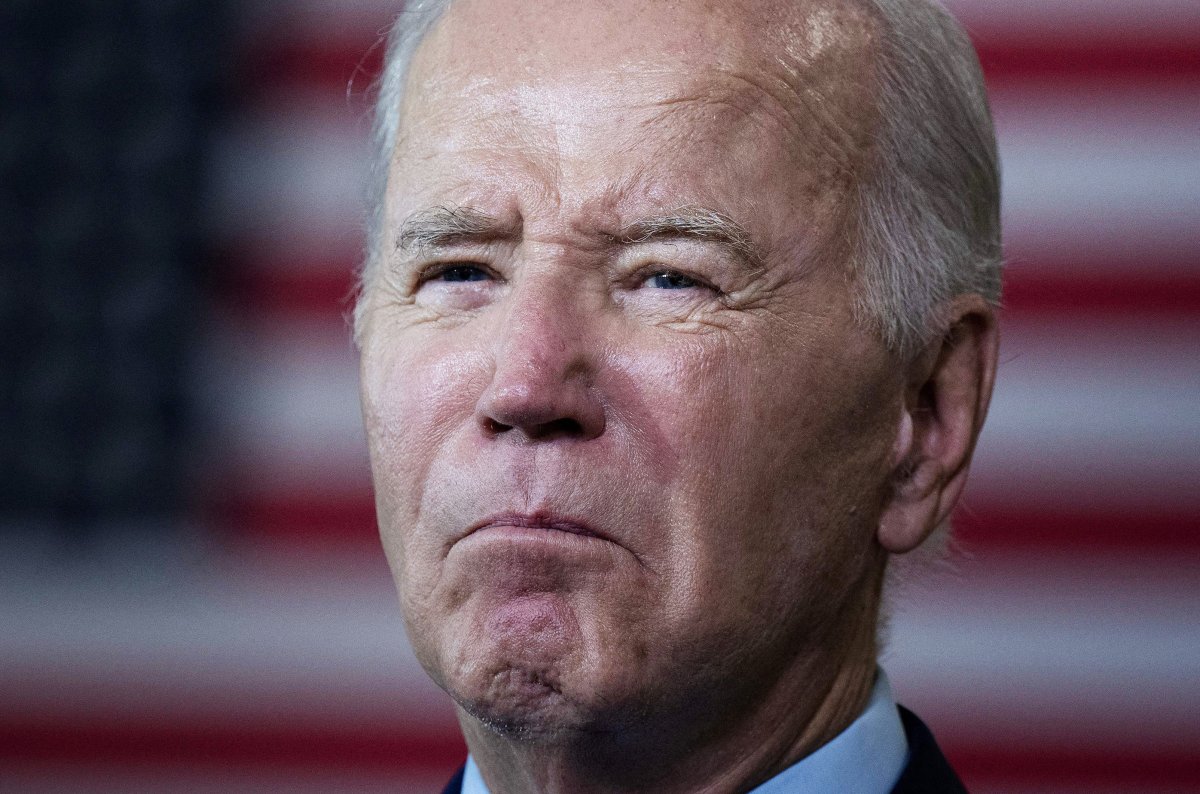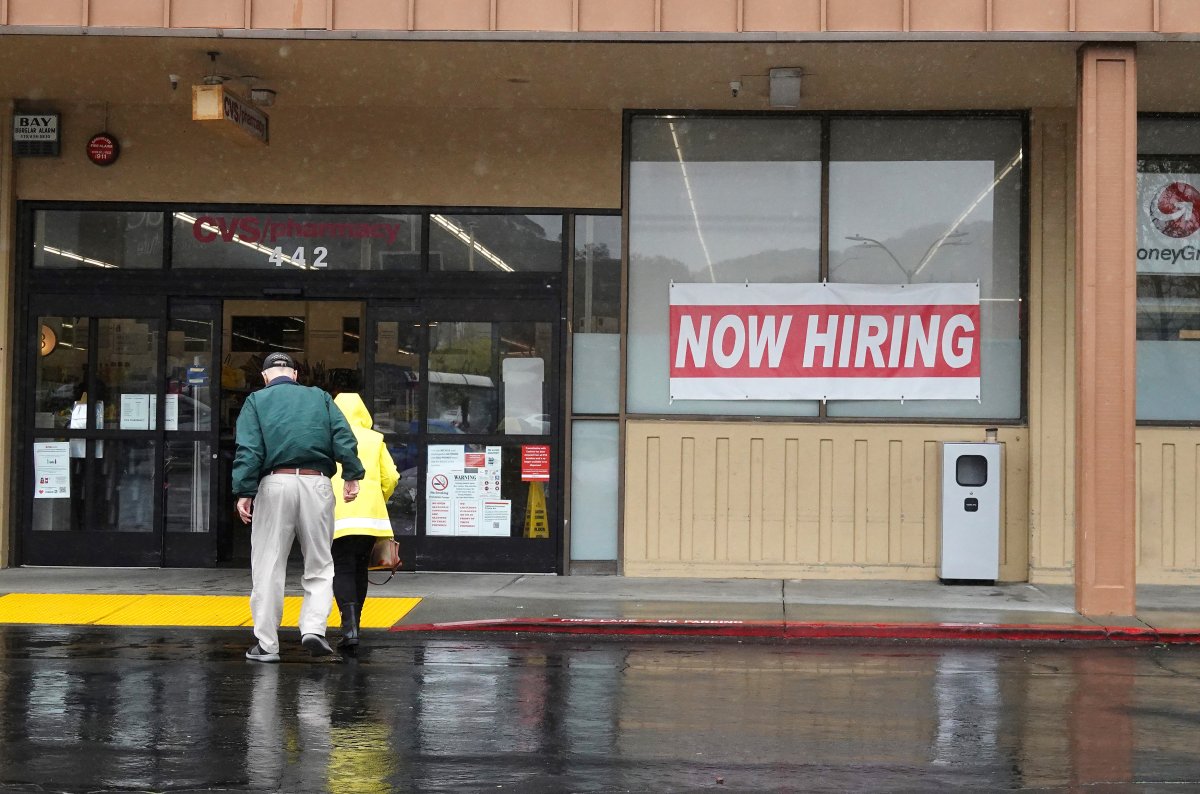- Inflation, unemployment and gross domestic product numbers are all giving Biden something to smile about.
- But even though Americans are making more than they did before the pandemic, their money is getting them a lot less than it did two and half years ago.
- "To think of this as a strong economy is a mistake, but to think of it as being much better than it was six months ago is not a mistake," Arthur Laffer, an economic adviser to former President Ronald Reagan, told Newsweek.
The United States economy is finally showing signs of significant improvement, much to the relief of President Joe Biden, but one area has challenged a total economic victory for his administration.
Last week, the Commerce Department announced surprisingly strong numbers for the second quarter of 2023. Gross domestic product (GDP), adjusted for inflation, grew beyond expectations and there was a boost in consumer spending and business investment. Unemployment continues to tick downward and average hourly earnings saw the largest 12-month percent gain since March 2021.
"If I were a Biden economist today, I'd be smiling," Arthur Laffer, an economic adviser to former President Ronald Reagan, told Newsweek on Thursday. "Inflation numbers are coming way down, employment numbers appear to be strong, real wages for the first time appear to be increasing, the GDP number is 2.4 percent—that at least in recent historical context is pretty damn good—the stock markets had 11 straight days of positive."
The GDP grew by more than half a percentage point faster than Bloomberg economists anticipated. The rise was attributed to a boost in consumer spending, which rose at a 1.6 percent rate, and a jump in business investment, which surged 7.7 percent this quarter.

In the week ending July 22, the U.S. saw the lowest number of jobless claims since February, with 221,000 people filing for unemployment. And earlier this month, the Labor Department said the U.S. economy finally saw wage growth cool, with average hourly earnings increasing 1.2 percent between June 2022 and June 2023.
But while American paychecks are finally outpacing skyrocketing inflation, they have not been growing anywhere near as fast as prices have the last two and a half years, Narayana Kocherlakota, former president of the Federal Reserve Bank of Minneapolis, told Newsweek. So the two extra dollars that workers are taking home is buying them considerably less than it would have two and a half years ago.
"Hourly compensation (which includes benefits as well as wages) in the first quarter of this year was 8.3 percent higher than at the end of 2020. This sounds like good news for workers," Kocherlakota said. "But, in fact, real hourly compensation (which takes into account the growth in the prices faced by workers) in the first quarter of this year was 7.4 percent lower than at the end of 2020."
Americans may be making more than they were in 2020, but their take-home pay does not get them as far as it did back then. Kocherlakota said the decline in workers' purchasing power means that even though recent economic reports suggest that the Federal Reserve can successfully, albeit slowly, bring inflation down without triggering a recession, it does not make some people feel happy about the current state of the economy.
While U.S. inflation reached its lowest point in more than two years in June, the 3 percent figure is still above the Fed's 2 percent target rate. This means that inflation, despite having fallen drastically from last year's 40-year high of 9.1 percent, has remained somewhat stubborn and Americans continue to feel it in the cost of things like food and housing, which are more sensitive to other factors like environmental and geopolitical factors.
The Department of Agriculture estimated in June that grocery inflation is 5.7 percent higher than it was in June 2020 and the June Consumer Price Index shows shelter inflation to be 7.8 percent than in June 2020.
All of this contributes to how people perceive the economy. Because people don't like inflation, even when their wages are up, Americans will focus on the slow pace of real wage growth, rather than real wage growth alone.
"Economists call it money illusion," Jason Furman, former President Barack Obama's top economic adviser, told Newsweek. "Say prices go up 8 percent and your wages go up 10 percent. That's the same as prices going up 2 percent and wages going up 4 percent, but people tend to like that second situation more than the first situation."
A recent poll from CNBC shows that 79 percent of Americans say the economy is fair or poor. Although just 20 percent of Americans consider the economy excellent or good, July's survey shows a slight gain from last quarter when only 14 percent of Americans said the same.
The poll showed some good news for President Biden. His economic approval rating inched up by 3 percentage points compared with April's survey, with 37 percent of Americans saying they currently approve of the president's handling of the economy. Nonetheless, Republicans continue to hold a double-digit lead over the Democrats when it comes to which party Americans think is best equipped to handle critical economic issues.
"To think of this as a strong economy is a mistake, but to think of it as being much better than it was six months ago is not a mistake," Laffer, who also advised Donald Trump's 2016 campaign, said.
Yale University's Jeffrey Sonnenfeld, however, argued that Biden should be getting credit where credit is due.

"Everything is going in the right direction," Sonnenfeld told MSNBC's Lawrence O'Donnell on Tuesday. "The cynicism out there is just something that's being echoed in a circular echo chamber of sorts, but the financial facts are something quite different than what the pollsters put out there."
"There's sort of this Rudy Giuliani-JFK Jr.-Alan Dershowitz-forget-me-not crowd that thinks you get attention by cynicism," he said. "Let's just focus on the facts instead of throwing around the ideology. The facts are, uniformly, positive. We haven't seen the economy like this, and the Biden administration has been more successfully economic interventionists than the New Deal, since the New Deal."
Even though gasoline prices, which have historically mattered a lot to people's perception of the economy, have fallen way down from where they were a year ago, they still haven't come down to 2021 levels and the market remains tumultuous. On Thursday, U.S. gas prices hit an eight-month high with the national average at $3.71 per gallon.
Although the current average shows a nearly 26 percent decline from June 2022's average of $5.006 per gallon, it's likely Americans will be more focused on the eight-month high than the 26 percent decline.
Furman predicts Americans won't be in a more optimistic mindset until next summer when they feel that the country is actually moving in a positive direction. But Laffer disagreed, saying the Biden administration would need to see a quicker rate of improvement, like a GDP of 3.5 to 4 percent, in order to declare a good U.S. economy.
Because much of Biden's economic success is relative, it's up to Americans to decide how they want to see economic indicators.
"You're in this hole and you're partway dug out of it," Furman said. "Do you focus on the fact that you're digging out of it or do you focus on the fact that you're still in a hole? Right now, people tend to be more focused on being in the hole."
Uncommon Knowledge
Newsweek is committed to challenging conventional wisdom and finding connections in the search for common ground.
Newsweek is committed to challenging conventional wisdom and finding connections in the search for common ground.
About the writer
Katherine Fung is a Newsweek reporter based in New York City. Her focus is reporting on U.S. and world politics. ... Read more





